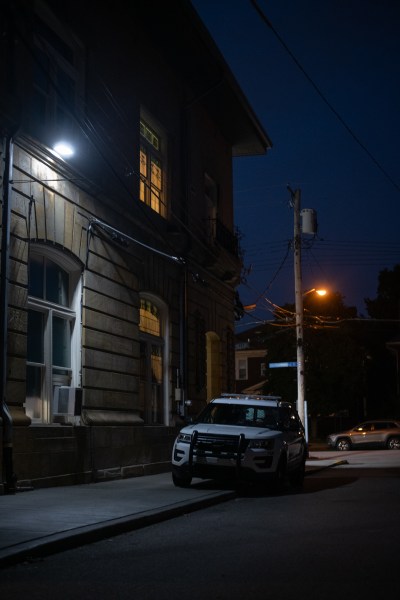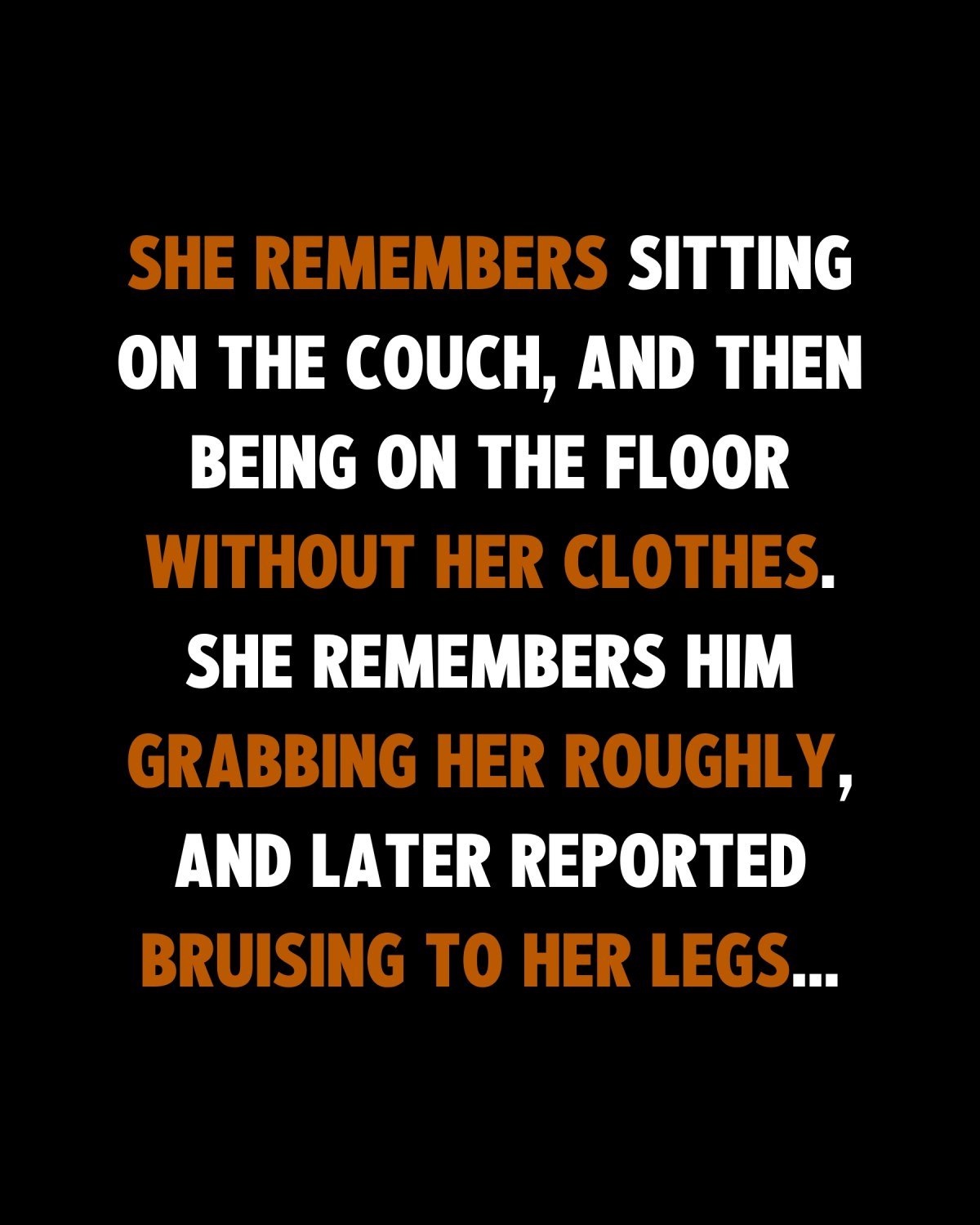Hope and John broke up in fall 2022, but he still lived in the Pittsburgh house they rented with another roommate for a few months afterward. During that time, Hope said, he was insistent about getting back together. He repeatedly touched her or kissed her on the head, even though she asked him not to. It was “not overtly sexual, just romantic and controlling and explicitly outside of the boundaries that I’d set,” she explained.

In an interview with PublicSource and in civil court documents, Hope shared that John eventually persuaded her to go on a date in early February. The two twentysomethings went out to a new bar, where she had two drinks, and a restaurant, where she had a third. The two ended up at another venue and continued drinking. She estimates she had eight drinks that night — much more than her usual intake, especially after eating little during the day.
By 11 p.m., Hope was dizzy and asked John to drive her home. She told a friend over the phone that she’d be going straight home, but John instead drove to a local park. From there, the alcohol begins to fade Hope’s memory, but she remembers how he parked, pulled her into his lap and forcibly kissed her, grabbing her neck and sides. She remembers how difficult it was to fight him off. Eventually, he drove them home and had to help her into the house.
A road in Pittsburgh’s East End. (Photo by Stephanie Strasburg/PublicSource)
She remembers sitting on the couch, and then being on the floor without her clothes. She remembers him grabbing her roughly, and later reported bruising to her legs in a court petition. The next morning, John told her he was stressed he didn’t use a condom and she said she was upset he had sex with her when she was not in a clear state of mind, Hope related in court documents.
“I slept a lot of that day,” Hope said. “I was really in shock. I kept falling asleep. I didn’t move around very much.”
PublicSource is withholding the names of the woman and her alleged assailant under standard journalistic practice in situations involving sexual violence, referring to them instead as Hope and John.
Hope reported the attack to city police about a week later. By then, Hope and her roommate had confronted John, told him to leave their shared residence and changed the locks. But John had not stopped texting and trying to contact her, and Hope feared for her safety. Around a week later, she went to family court and got a temporary protection from abuse order.
By reporting her attack to law enforcement, Hope triggered a process that often ends in disappointment for survivors — but unknowingly, that was also her first step in an effort to hold the system accountable to survivors and answer for why justice is not always sought, let alone served.
Night falls on a police station in Pittsburgh. (Photo by Stephanie Strasburg/PublicSource)
A typical pattern
Over 50 years spent advocating for rape survivors in Allegheny County, Pittsburgh Action Against Rape [PAAR] has learned to manage people’s expectations.
“A lot of survivors come into this really believing that there will be justice, and that people will believe them, and that their case will move forward. And to find out that the vast majority of the time that’s not true, can be very difficult,” said Megan Schroeder, director of victim response at PAAR. “You don’t want to dampen their sense of hope or their sense of justice, but we also want them to be prepared for what we know is likely going to happen.”
Read more: The Red Zone
According to the Rape, Abuse and Incest National Network [RAINN], 31% of sexual assaults are reported to law enforcement — a low figure attributed in part to survivors assuming they will not be believed or supported by law enforcement. About 5% of all sexual assaults lead to arrests, and fewer still to prosecution.
Locally, municipal police and the Allegheny County District Attorney have roles in addressing sexual violence.
The Allegheny County Courthouse, which includes the district attorney’s office. (Photo by Stephanie Strasburg/PublicSource)
In Pennsylvania, “detectives build the case, but it is the discretion of the DA’s office which ultimately determines whether charges will be brought,” said Cara Cruz, a spokesperson for Pittsburgh’s Department of Public Safety.
According to PAAR and the Women’s Law Project, a nonprofit that advocates for women, girls and LGBTQ+ people, survivors assaulted by a current or former partner often hit dead ends in the criminal justice system, even when they have physical evidence.
Read more: Anti-violence teams surge as $50 million in Allegheny County funding flows
“We don’t know how often it is that a prosecutor will just simply decline to bring a prosecution in a rape case,” said Sue Frietsche, senior staff attorney and interim co-executive director of the Women’s Law Project, which has offices in Pittsburgh and Philadelphia. “However, just anecdotally, we are alarmed by the number of people who are coming to the Women’s Law Project, and the fact patterns are typically that they know their assailant, so there’s some prior relationship.”
Frietsche said she is reluctant to second-guess the prosecutors. “But where there is physical evidence of bodily trauma and you have a willing witness, and there’s no prosecution because they knew each other, that’s really disturbing.”
Low case numbers, high conviction rates
Cruz said city police look into all alleged rapes thoroughly, without concern over whether the report will culminate in a criminal case.
The city’s Special Victims Unit [SVU] “investigates all crimes that come in, regardless of the final outcome,” Cruz said. “The outcome cannot be determined until an investigation has been initiated and completed.”
The county does not share publicly any breakdown of the cases prosecutors choose to take on or decline, so it’s impossible to know exactly how often the district attorney’s office declines to file charges for reported rapes after an investigation by local law enforcement.
A PublicSource analysis of court records shows that 72 cases of rape, involuntary deviate sexual intercourse, sexual assault and/or aggravated indecent assault were filed in Allegheny County between 2017 and 2022, an average of 12 cases per year. (This count does not include cases that PublicSource determined to include rape of a minor under 18.)
Read more: Pittsburgh council protects gender-affirming care from out-of-state prosecution
Of the 61 closed cases, 51 resulted in felony convictions, or 84%.
That conviction rate is much higher than national averages. RAINN estimates that 56% of rape and sexual assault cases that make it to the prosecution stage end in felony convictions.
Schroeder said Allegheny County’s high conviction rate could be driven by prosecutors’ decisions to charge only “the stronger cases with fewer barriers,” especially if “you're seeing the decisions up front weeding out the cases that might come with challenges or barriers."
In response to inquiries about his office’s policies in pursuing rape cases involving current or former intimate partners, Allegheny County District Attorney Stephen Zappala wrote in a letter to PublicSource that a “large percentage” of sexual assault prosecutions in the county have involved intimate partner violence.
He said his office makes “every effort … to accept a prosecution and attempt to achieve justice for a survivor.” He cited sufficiency and admissibility of evidence and a survivor’s wishes as reasons that his office may decline to prosecute cases of sexual violence.
Read more: Shelter space around downtown Pittsburgh dwindles with another closure
“That does not negate the reality of a survivor's trauma, and we empathize when a survivor is disappointed with a decision not to prosecute,” Zappala wrote. “These decisions are based solely upon a review of the evidence that would be available at trial and the burden of proof beyond a reasonable doubt.”

Survivor advocates say a major underlying theme is the persistence of rape myths — false ideas about what sexual violence and its survivors look like, from what they wear to what they drink, and whether consent to past sexual encounters makes a difference.
In reality, rape is largely not committed by random strangers on the street: RAINN has found that 39% of rapes are committed by acquaintances, 33% by current or former partners and 19.5% by strangers, with the remaining committed by multiple people, a person the victim cannot remember or a non-spouse relative.
“All of those kinds of stereotypes and false beliefs contribute to a culture in which it's more difficult, possibly, to get a conviction,” Frietsche said. “I'm not saying that the prosecutors themselves necessarily subscribe to these beliefs. It's just, if it's more difficult to get a conviction, then possibly those cases become less attractive when you're dealing in a world of limited resources.”
Lack of accountability
Hope said a detective from the Pittsburgh Special Victims Unit came to interview her in her home in March. John’s behavior started to escalate in the weeks following. Hope later reported to police that John stood outside her house in the middle of the night and drove past her job while she was working.

“I was really scared to be out in public. I felt like I couldn't leave the house safely and I felt like I couldn't be alone in places that he knew where I was. So I had to leave my job and that was really hard,” Hope said.
In early April, Hope said, the detective came back to her with news: The district attorney’s office would not take her case any further.
Hope immediately wanted to know what she could do to make the county prosecutors reconsider their decision. She turned to the Women’s Law Project.
When prosecutors decline to file charges for an alleged sexual assault, there are few options available to survivors, according to Frietsche. A survivor may be able to take private civil action against their alleged assailant or request that the prosecutor revisit their decision, but ultimately, it’s within the discretion of the district attorney’s office to decline any case. There is no appeal process for those decisions.
Hope told PublicSource that she was able to get a meeting with an assistant district attorney, the SVU detective who investigated her case and her PAAR advocate. She left that meeting feeling only more frustrated, with the same answer she had before.
To her dismay, she felt like it didn’t matter that she was a cooperative witness. It didn’t matter that she was willing to withstand brutal questioning from John’s defense attorneys and understood the possibility that the case could end without a conviction. It didn’t matter that her doctor documented her inflamed labia after the assault.
“Whether charges are filed or not, I was raped and I was hurt and then I was harassed,” Hope said. “I would like there to be some accountability.”
Read more: A year after Roe’s end, Pittsburgh’s abortion clinics still contend with out-of-state influx
To Hope, accountability doesn’t necessarily have to mean John going to jail — in fact, she doesn’t think incarceration would help him. Instead, she wants him to have to go to therapy, to acknowledge how his abuse hurt her emotionally, physically and sexually.
This mindset isn’t uncommon, according to Schroeder — especially in cases where survivors have a current or former relationship with their assailant. It’s one of the reasons a significant number of rape and sexual assault cases end in plea deals.
The Allegheny County Courthouse, which includes the district attorney’s office, in Pittsburgh. (Photo by Stephanie Strasburg/PublicSource)
“A lot of our clients go into the system wanting accountability and wanting the person to understand that what they did was wrong, and they want some assurances that it's not going to continue to happen in the future,” Schroeder said. “You can get mandatory treatment and court supervision and probation for a lot of these cases without incarceration. We do have a good number of adult victims who choose to go that route.”
Another reason many rape prosecutions end in plea deals is so survivors don’t have to endure a trial.
The Pennsylvania State Supreme Court ruled in 2018 that a survivor’s testimony, even if uncorroborated by external evidence, can be enough to secure a conviction if the jury is convinced beyond a reasonable doubt. But a survivor whose case goes to trial may be forced to testify about their trauma and have the details of that testimony picked apart by defense attorneys to sow doubt in the jury.
“It's not an easy process. That being said, some people are willing to go through that process,” said Jayne Lester, an advocacy manager at PAAR. “They're survivors for a reason. They get through it. People will come out on the other side and say, ‘Look, I'm so glad I did that, even if it was a bad outcome.’”
An infinite ladder
For the past six months, Hope has been working her way through the criminal justice system — from reporting the attack to police to interviewing with detectives to meeting with prosecutors to consulting with advocates.
Read more: Pittsburgh higher ed steps up sexual assault interventions ahead of annual spike in cases
“It feels like I kept climbing this ladder, and at every rung of the ladder people told me, ‘We believe you, the hardest part is over, and we are going to make this better,’” Hope said.

“At every step I was climbing this ladder, trusting that at some point we would have reached the top and at the top things would be safe and OK. And I keep climbing, but there's no end to this.”
Still, she isn’t ready to get off that ladder. While the district attorney’s office hasn’t changed course on its decision to not pursue rape charges, prosecutors have filed a stalking and harassment case against John.
Hope said she plans to keep asking prosecutors to press rape charges, especially in the event of a new district attorney taking office next year.
“I feel like giving up would mean making myself smaller and deciding that it's more important that it'd be easy than that it'd be true,” Hope said. “I feel good about what I've done. I did everything that I could have done. I exhausted every option, every avenue, and I took up space and I didn’t just roll over and let this thing happen. And that feels brave. That felt important.”
Alexandra Ross is an editorial intern with PublicSource and a recent graduate of the University of Pittsburgh. You can reach her at aross@publicsource.org or @AlexandraNRoss on X, formerly known as Twitter.
This story was fact-checked by Matt Maielli.







